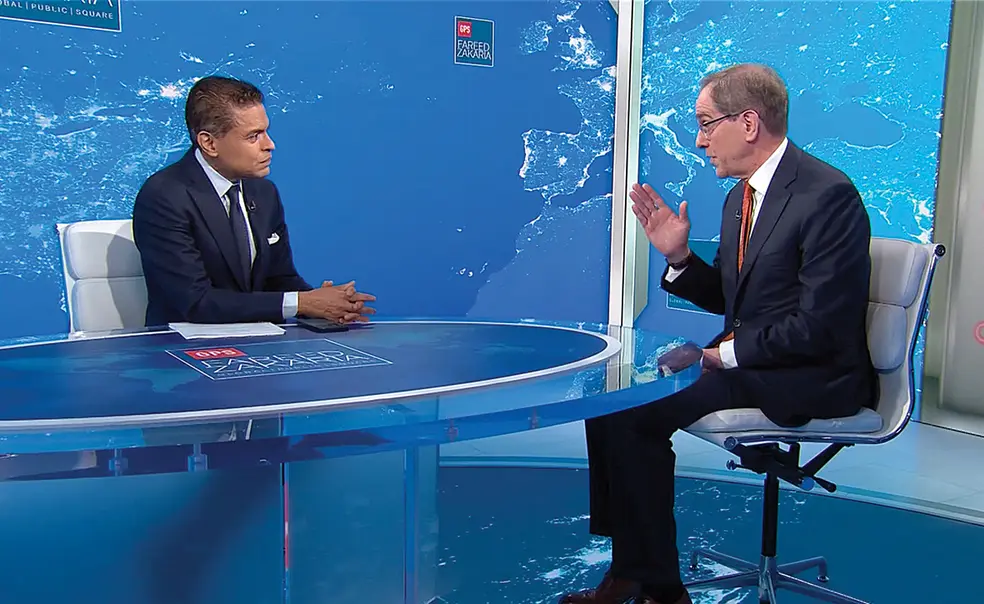Speaking Up for Princeton and Higher Education
Among supporters of higher education, the conventional wisdom these days is that university presidents should keep their heads down rather than attract attention. Our detractors, meanwhile, insist that if we must speak, it should be mainly to ask for forgiveness.
I am taking a different approach: accepting more interviews with a wide variety of journalists and podcasters, and speaking up for American higher education, not apologizing for it.
This approach is risky and the conventional wisdom is understandable. Some fellow presidents have told me that they not only avoid interviews but also insist on taking only pre-screened questions when they appear in public, including at their own alumni gatherings.
Ambivalence about presidential speech is not new. Clark Kerr, who led the University of California system through a tumultuous period in the 1960s, wrote decades later that he regretted publishing a much-discussed book about university governance while still in office. “I have concluded that it is a disservice to the presidency to speak” other than in “laudatory platitudes” that arouse little interest, he said.1
Kerr’s comments were probably tongue-in-cheek. He spoke intrepidly and effectively throughout his career. Whether Kerr’s comments were serious or not, there are good reasons for university presidents to be judicious about politically sensitive topics.
The main job of a university administration is to enhance the capacity of students and faculty to study, learn, research, speak, and publish. Presidents who unnecessarily attract political fire may thereby jeopardize the academic freedom and financial support upon which their institutions depend.
The advent of online media made it tempting and easy for presidents to blog, tweet, or comment on public events — and for our various constituencies to pressure us to do so. Many of us (myself included) did so too often, as critics have rightly pointed out.
I now caution our entering undergraduates each year that if they ask me for a statement “endorsing some position that [they] cherish or condemning some practice that [they] abhor …, I will almost certainly refuse.” My job is to ensure that they and others can speak for themselves, not to tell them what they should think.
Yet, even as I am issuing fewer online statements about current events, I am also taking more interviews about higher education and the policies affecting it. American colleges and universities are in the political crosshairs, and we can either tell our story or let others define our narrative.
In the first two months of this academic year, I gave more than 20 on-the-record interviews, including with The Financial Times, NPR, PBS, Fareed Zakaria on CNN, the editorial boards of The New York Times and USA Today, Fox News Chicago, Kara Swisher, Harry Litman’s Talking Feds, BBC World News, The New Yorker, and The Chronicle of Higher Education. More appearances lie ahead.
Answering the same questions over and over can be a slog, but persistence is essential because those of us speaking up for higher education are fighting an uphill battle. Accusations and outrage generate clicks, but good news excites less attention. When Patrick Smith, co-host of WBEZ in Chicago’s “Say More,” welcomed me onto his show to discuss my book Terms of Respect: How Colleges Get Free Speech Right, he joked that I could have sold more copies if I had attacked colleges and young people instead of defending them.
America’s colleges and universities can always be better, of course. We should engage seriously with thoughtful criticism. I am grateful for the many tough questions put to me recently by journalists. I don’t accept the premise of every critique, but I always appreciate the opportunity to provide context or set the record straight.
I also think it is my duty to be clear, confident, and forthright about the strengths of our institutions. America’s great research universities are magnets for talent from throughout our country and the world. They deliver outstanding educations, along with research that improves the prosperity, health, and security of the American people. They are the best the world has ever seen — and I believe they are better today than they have ever been. We weaken them at our peril.
I am heartened by the many Princetonians who have joined me in telling the story of the university that we love and of higher education more broadly. Others who are interested in making the case for America’s colleges and universities can find information about the “Stand Up for Princeton and Higher Education” initiative at standup.princeton.edu.
Kerr may have been right that, when it comes to presidential rhetoric, “discretion is the better part of valor.” But discretion is not the same thing as reticence or silence. All our voices are essential in this moment when academic freedom, federal research funding, and the future of American universities hang in the balance.
1 Clark Kerr, The Uses of the University, 5th ed. (Harvard University Press, 2001), 160.












1 Response
Richard M. Waugaman ’70
2 Months AgoStrengthening Academic Freedom
In such challenging times for universities, Princeton is fortunate to have Christopher Eisgruber as our president. He strongly defends the diversity that strengthens academic freedom and the enriching interchange of multiple points of view.
When asked what the key to success is, someone replied, “I don’t know. But the key to failure is trying to make everyone happy.”